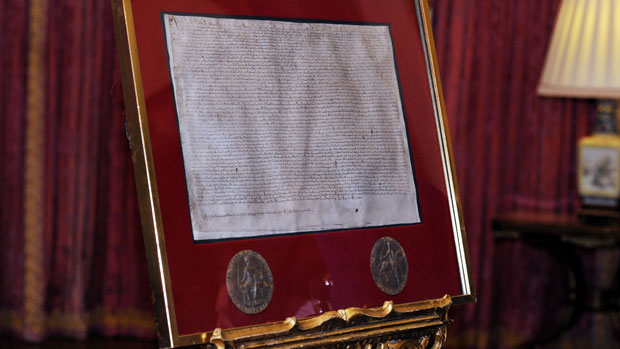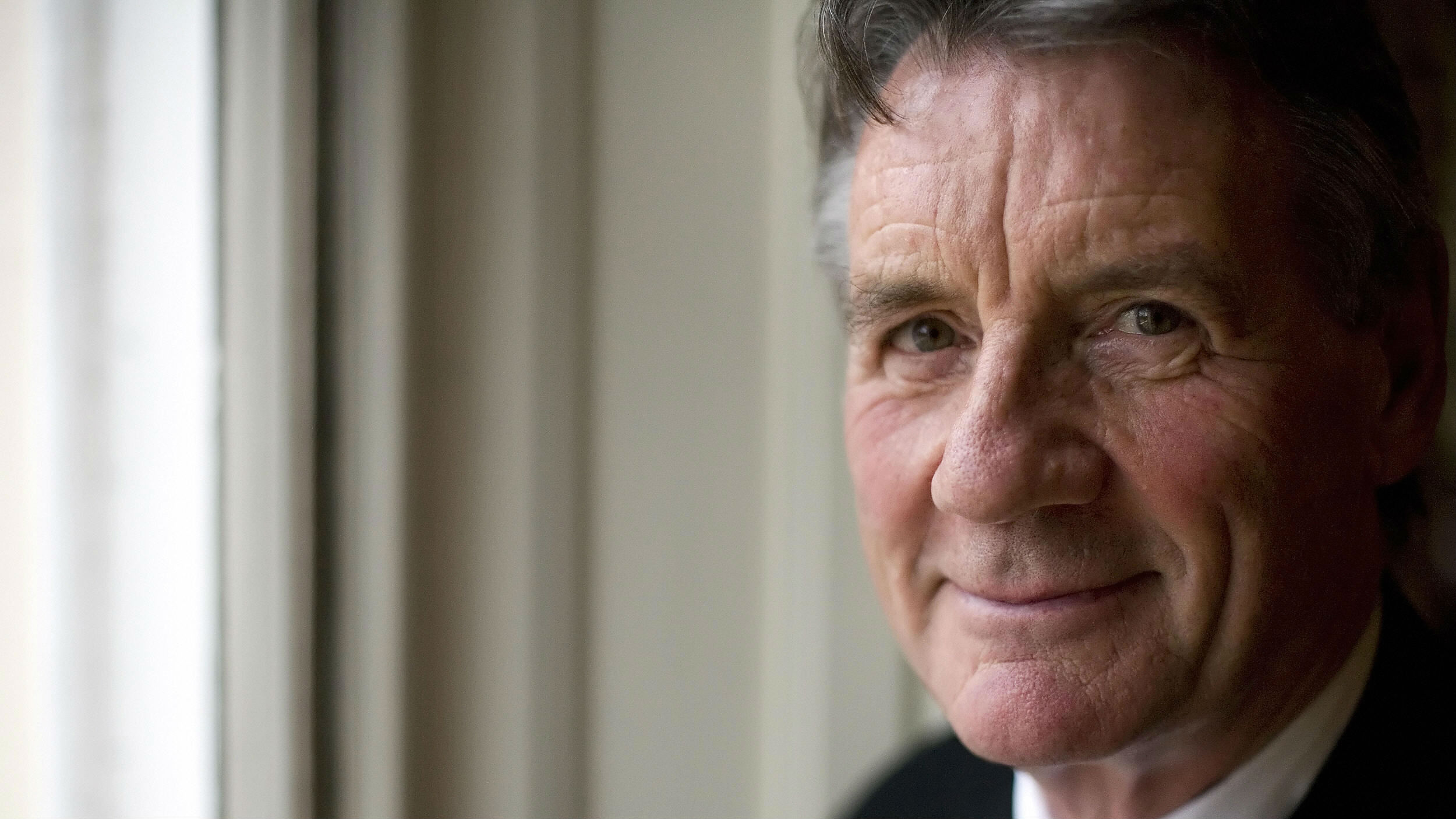Magna Carta’s 800th anniversary: what is it and does it matter?
Mock trial of bishops and barons will be held to mark 800 years since the document was signed

A free daily email with the biggest news stories of the day – and the best features from TheWeek.com
You are now subscribed
Your newsletter sign-up was successful
The Palace of Westminster will hold a mock trial of barons and bishops to mark the 800th anniversary of the signing of the Magna Carta.
Barons and bishops forced King John to sign the sacred document in 1215. On 31 July, these historic characters, played by eminent figures such as Lord Lisvane and Lord Judge, are to be "tried" for treason because of their refusal to surrender London to the King.
Other leading figures from the worlds of law, politics and academia will also be appearing at the trial, which will be watched by members of the public.
The Week
Escape your echo chamber. Get the facts behind the news, plus analysis from multiple perspectives.

Sign up for The Week's Free Newsletters
From our morning news briefing to a weekly Good News Newsletter, get the best of The Week delivered directly to your inbox.
From our morning news briefing to a weekly Good News Newsletter, get the best of The Week delivered directly to your inbox.
The comedian and former barrister Clive Anderson will play the role of King John and his counsel will make the case that the bishops and barons acted with far more power than they were entitled to and were actively disloyal to the King, whom they had all sworn allegiance.
The Guardian reports that the trial will be heard by Lord Neuberger, president of the UK's supreme court, Justice Stephen Breyer of the US supreme court, and Dame Sian Elias, chief justice of New Zealand.
Lord Judge, who is to play the Earl of Pembroke at the trial, told the Daily Telegraph: "While the weight of modern scholarship certainly suggests the barons' and bishops' resistance was the right thing to do, the 800th anniversary of the Magna Carta is a chance to test whether a court of law would say that their ends justified their means."
Lord Neuberger said: "We can't promise a polished theatrical performance, but we do hope to offer a creative and interesting way of retelling the great Magna Carta story that encourages people to think about the battle of wills and principles that lay behind this world-famous treaty."
A free daily email with the biggest news stories of the day – and the best features from TheWeek.com
So what makes the Magna Carta so important? And what is its legacy today?
What is the Magna Carta?
Signed by King John on 15 June 1215 at Runnymede, the Magna Carta was a document outlining basic rights that established the principle that no one was above the law – including the king. It was first drafted by the Archbishop of Canterbury as a peace offering between the unpopular monarch and a group of rebel barons.
What reforms did it introduce?
The 4,000-word document ushered in the right to a fair trial and limited taxation without representation. It was the first formal document stating that a king had to follow the laws of the land and it guaranteed the rights of individuals against the wishes of the king. "To no one will we sell, to no one deny or delay right or justice," runs one of its most famous clauses.
Where is the document kept?
There are four surviving copies of the 1215 Magna Carta: two are kept at the British Library, one is currently at Lincoln Cathedral, and one at Salisbury Cathedral. All four were brought together at the British Library earlier this year – just one of the hundreds of commemorative events planned this year.
What about other early editions?
As well as the four manuscripts from 1215, there are 20 editions from 1300 known to be in existence – but historians hope that more may yet be uncovered. Earlier this year, a 1300 Magna Carta was discovered in the archives of Kent County Council in Maidstone. The document, believed to be worth up to £10m, belongs to the town of Sandwich, which leads some experts to suggest that other early copies may still be languishing in official stores. "It must have been much more widely distributed than previously thought because if Sandwich had one ... the chances are it went out to a lot of other towns," Professor Nicholas Vincent of the University of East Anglia told The Guardian. "It is very likely that there are one or two out there somewhere that no one has spotted yet." Sandwich is not expected to put its Magna Carta up for sale.
Does the Magna Carta still matter?
Technically, only three clauses of the document remain valid: the clause guaranteeing the rights of the English Church; the section that confirms the privileges of the City of London and other towns; and the segment that states that no free man shall be imprisoned without the lawful judgement of his equals.
But its legacy is still felt around the world. The Magna Carta has been hugely influential, inspiring a number of other documents, including the US Constitution and the Universal Declaration of Human Rights.
With concerns over online privacy growing, the British Library invited students to write their own individual clause for a new document, which will become part of a new Magna Carta for the digital age.
How is Magna Carta being celebrated?
The UK has been commemorating the 800th anniversary of the Magna Carta with special events, speeches and exhibitions. Google also joined the celebrations with a humorous doodle depicting King John of England signing the famous document.
On 15 June, the Queen attended commemorations on the banks of the River Thames at Runnymede in Surrey, where the treaty was signed in 1215. A statue of Her Majesty was unveiled at the site and an art installation by Hew Locke was presented to the Duke of Cambridge. The artwork, called The Jurors, is "inspired by the 39th clause of the Magna Carta", Locke says, which gives everyone the right to a fair trial. A copy of the document was sailed down the River Thames on the Royal Barge Gloriana, escorted by a flotilla of 200 boats. The Gloriana set out on its journey from Hurley in Berkshire on 14 June and arrived in Runnymede the following day.
Are today's politicians paying Magna Carta due respect?
When David Cameron appeared on the David Letterman chat show in 2012, he was forced to admit he did not know what the words Magna Carta mean. "I might have ended my career on your show tonight, " said the embarrassed prime minister. (The words are Latin for "great charter".)
Earlier this year, historian David Starkey fronted a documentary that accused Cameron, and Tony Blair before him, of forgetting many of the Magna Carta's political lessons. He spoke of a nation sleepwalking towards authoritarianism.
Labour politician Tony Benn invoked the document when he argued against a reform which allowed the imprisonment of terrorist subjects for 42 days without trial. The former cabinet minister, who died last year, told the chamber: "I never thought I would be in the House of Commons on the day Magna Carta was repealed."
On another occasion Benn was dismissive of it. "Magna Carta is sometimes spoken of as the birthplace of democracy," he said. "It's actually rubbish. Magna Carta was a struggle between the king and the landowners, it had nothing to do with the people, the people were entirely excluded".
-
 ‘Restaurateurs have become millionaires’
‘Restaurateurs have become millionaires’Instant Opinion Opinion, comment and editorials of the day
-
 Earth is rapidly approaching a ‘hothouse’ trajectory of warming
Earth is rapidly approaching a ‘hothouse’ trajectory of warmingThe explainer It may become impossible to fix
-
 Health insurance: Premiums soar as ACA subsidies end
Health insurance: Premiums soar as ACA subsidies endFeature 1.4 million people have dropped coverage
